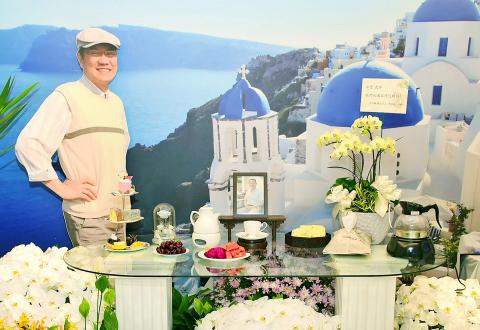Government leaders and prominent public figures yesterday paid tribute to political commentator Chen Li-hung (陳立宏), 52, who died of a brain tumor at a Taipei hospital on Wednesday, following several operations and chemotherapy over the past three years.
“All his life, Li-hung, using pen and microphone, let people see what is good about Taiwan and the important values of our democracy,” President Tsai Ing-wen (蔡英文) said on Facebook.
“I want to express my gratitude for what he has done for this land of ours. I shall not forget his ideals and I shall not let him down,” Tsai wrote.

Photo: Chung Chih-kai, Taipei Times
“We are deeply saddened by Li-hung’s passing,” Democratic Progressive Party (DPP) LLegislative Speaker Su Jia-chyuan (蘇嘉全) said. “Always concerned with our nation’s future, he spoke up on many issues and gave valuable insight on current affairs.”
“We will vividly remember his great work and incisive remarks. People were touched by his fighting spirit that never quit,” Su said.
“Chen was a media personality who articulated views based on his love for Taiwan. He always had a smile on his face and told people how proud he was of being Taiwanese. Everyone saw his contributions to the nation,” Su said.
Doctors diagnosed Chen with a malignant brain tumor at an advanced stage in 2015.
Chen’s final public appearance was in Changhua County in January last year, when he spoke on behalf of then-presidential candidate Tsai in the run-up to the election.
At that time, Chen said that after learning of the illness, he felt the affection and caring of all Taiwanese.
“I must go on living and fight off the grip of death,” he said.
During that final appearance, Chen displayed optimism about his condition.
“God is looking kindly over me so that I am getting better. He is allowing me to see the DPP become the ruling party,” he said.
“I want to go on living, because I want to see the dawning of a bright future for Taiwan,” he said.
A second-generation Mainlander born in then-Tainan County, Chen went into journalism after graduating from National Taiwan University with a degree in political science.
He worked for the Chinese-language China Times Express and United Evening News, before branching into radio broadcasting and later becoming a political commentator on TV talk shows.
Although he was associated with the pan-blue camp and its affiliated media outlets earlier in his career, Chen later became more associated with the pan-green camp, hosting shows on the Greenpeace Broadcasting Station and working with pro-Taiwan localization groups.
“I spoke to him when he was getting treatment,” New Power Party Legislator Freddy Lim (林昶佐) said. “Chen did not say much about his condition, but he was most concerned about Taiwan’s future and its political development… I am anguished after learning that he has departed.”

Alain Robert, known as the "French Spider-Man," praised Alex Honnold as exceptionally well-prepared after the US climber completed a free solo ascent of Taipei 101 yesterday. Robert said Honnold's ascent of the 508m-tall skyscraper in just more than one-and-a-half hours without using safety ropes or equipment was a remarkable achievement. "This is my life," he said in an interview conducted in French, adding that he liked the feeling of being "on the edge of danger." The 63-year-old Frenchman climbed Taipei 101 using ropes in December 2004, taking about four hours to reach the top. On a one-to-10 scale of difficulty, Robert said Taipei 101

A preclearance service to facilitate entry for people traveling to select airports in Japan would be available from Thursday next week to Feb. 25 at Taiwan Taoyuan International Airport, Taoyuan International Airport Corp (TIAC) said on Tuesday. The service was first made available to Taiwanese travelers throughout the winter vacation of 2024 and during the Lunar New Year holiday. In addition to flights to the Japanese cities of Hakodate, Asahikawa, Akita, Sendai, Niigata, Okayama, Takamatsu, Kumamoto and Kagoshima, the service would be available to travelers to Kobe and Oita. The service can be accessed by passengers of 15 flight routes operated by

Taiwanese and US defense groups are collaborating to introduce deployable, semi-autonomous manufacturing systems for drones and components in a boost to the nation’s supply chain resilience. Taiwan’s G-Tech Optroelectronics Corp subsidiary GTOC and the US’ Aerkomm Inc on Friday announced an agreement with fellow US-based Firestorm Lab to adopt the latter’s xCell, a technology featuring 3D printers fitted in 6.1m container units. The systems enable aerial platforms and parts to be produced in high volumes from dispersed nodes capable of rapid redeployment, to minimize the risk of enemy strikes and to meet field requirements, they said. Firestorm chief technology officer Ian Muceus said

MORE FALL: An investigation into one of Xi’s key cronies, part of a broader ‘anti-corruption’ drive, indicates that he might have a deep distrust in the military, an expert said China’s latest military purge underscores systemic risks in its shift from collective leadership to sole rule under Chinese President Xi Jinping (習近平), and could disrupt its chain of command and military capabilities, a national security official said yesterday. If decisionmaking within the Chinese Communist Party has become “irrational” under one-man rule, the Taiwan Strait and the regional situation must be approached with extreme caution, given unforeseen risks, they added. The anonymous official made the remarks as China’s Central Military Commission Vice Chairman Zhang Youxia (張又俠) and Joint Staff Department Chief of Staff Liu Zhenli (劉振立) were reportedly being investigated for suspected “serious